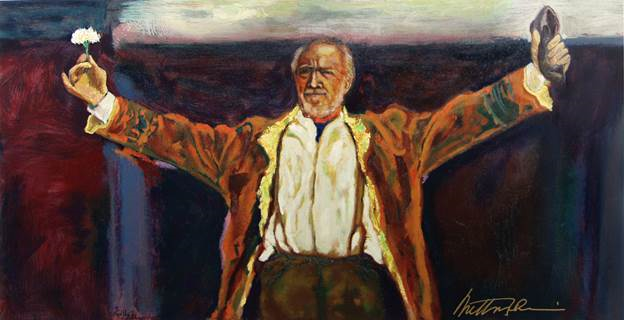 Submitted by Now What on
Submitted by Now What on

“Let people be, boss; don’t open their eyes. And supposing you did, what’d they see? Their misery! Leave their eyes closed, boss, and let them go on dreaming!” (1)
― Nikos Kazantzakis, Zorba the Greek
Zorba is the larger- than- life passionate, earthy and unpredictable protagonist of Nikos Kazantzakis’ 1946 novel: Zorba the Greek. The original Greek title was The Life and Times of Alexis Zorbas, but as the novel was widely translated and it became renowned internationally it was eventually and extemporaneously renamed Zorba the Greek.
Interestingly, the Alexis character was actually based on a real person named Yorgis Zorbas, who was a friend and mentor to Kazantzakis.
As legend goes, it was Zorbas who taught Kazantzakis the art of fully living in each moment without regret or fear and most importantly with a deep feeling of awe, gratitude and wonder for whatever life presents – be it pleasure or pain – the “full catastrophe.” Ultimately, Zorbas embodies a childlike willingness to surrender (allow) and trust whatever life manifests moment by precious moment – the good, the bad, or the ugly.
“Those who met him [Yorgis Zorbas] speak of a person free of social conventions, illiterate yet ingenious, and profoundly philosophical, which is why he touched Kazantzakis’ soul.” (2)
Some believe the magic of Zorba was his innate ability to see the same “old” things each day as if new and miraculous, like an artist. Others contend that Zorba was more than an iconic, fleeting and finite character. They posit that Zorba is a timeless, archetypical character spontaneously expressing the indestructible and essential life force that animates and manifests as individual life, the invisible presence and substance that temporarily becomes LIFE in all its myriad forms, yet exists eternally beyond name and form.
Zorba the Archetypal Fool
“To be a Fool means to risk. It means to take a chance. It means fearlessly walking into the unknown, blissfully ignorant of what is to come. To be the Fool, is to embrace innocence. It is to trust possibility, and allow experience to be our teacher.” (3)
“You think too much, that is your trouble. Clever people and grocers, they weigh everything.”
– Alexis Zorba (1)
The story of Zorba the Greek is simple, direct, and like the best poetry leaves a strong, vivid, impression on the soul. It acts like a classic Zen koan. It has the ability to cut through the delusions of the mind and cause a sudden awakening of the slumbering soul in a worthy student.
Basil (Alan Bates) is a 30ish half English half Greek writer born and raised in England. The story opens in Pireaus, the port city of Athens with Basil en route to the picturesque Greek island of Crete. He had recently inherited a small cottage and a long abandoned lignite mine there.
And frankly, Basil was more than grateful to have the opportunity to escape the hectic, cosmopolitan life of urban England in exchange for the solitude and ascetic tranquility the island of Crete seductively offered. You see, he had been suffering a long and troubling bout of writer’s block, so he reasoned that he would finally be able to finish his book, a biography on Buddha, while basking in the sun drenched peace of the quaint Greek island. Little did Basil know that destiny had cleverly arranged for him to meet his very own Greek Buddha in the form of Zorba.
In 1964, Zorba the Greek was released as a film. Here’s a synopsis for those unfamiliar with the movie.
The movie opens with Basil (Alan Bates) standing on a dock, umbrella in hand, admonishing workers to be careful with his trunks. He’s told the ship to Crete is delayed. In response to the news, Basil makes his way inside to the rustic comfort of the waiting area.
The intellectual Basil, clad in proper English attire, sat reading in the crowded transit room patiently anticipating his ship’s arrive, when suddenly the rugged, charismatic, peasant Alexis Zorba (Anthony Quinn) enters the room. Like a magnet Zorba was attracted to Basil and quickly introduced himself.
He exuberantly announced that he too was headed for Create and spontaneously enumerated the litany of ways he would be useful to Basil including: his experience with lignite mines, his cooking ability and anything related that spontaneously popped into his head. Thus begins one of the most memorable and philosophically profound relationships ever brought to the big screen. (4)
“As to the major philosophical questions that preoccupy the narrator, through plain thinking and the experience of a tumultuous life, Zorba shows him that the answers – if they do exist – are not to be found in books, but in life itself, as long as it is lived passionately, free of hopes and expectations…” (2)
The story exudes a raw spiritual power, a glimpse into the unfettered workings of the invisible life force operating without artificial restraint through the visible form of Zorba. The film has the remarkable ability to seduce one into wondering what life might be like if lived authentically from the infinite, unconditioned fullness of the center of ones being, as opposed to the cramped, finite periphery between the conditioned mind and personality.
To the attentive, Zorba is not merely a quirky and entertaining imaginary character, but rather a real teacher who demonstrates how to live life fully in the NOW. In Zorba’s version of life, happiness and joy are found in utter simplicity – immersed in this unique moment, fully engaged in the mysterious dance called life, unfettered by crippling inhibitions.
As Zorba himself says of death: “Act as if death did not exist, and act with death in mind at every moment…” and “…I look on death every moment and I’m not afraid; yet I never say I like it. No, I don’t like it at all! Am I not free? I refuse to sign up!” (1)
5 Perennial Life Lessons Learned from “Zorba The Greek”
1. Learn to grow through adversity
“Life is trouble. Only death is not. To be alive is to undo your belt and look for trouble.” – Zorba the Greek (1)
Lesson: Through adversity we discover our core strength. Life’s challenges temper the soul. Obstacles are equivalent to spiritual weight lifting. Stormy seas make skillful sailors.
2. Live in the now. Say YES to life!
“God changes his appearance every second. Blessed is the man who can recognize him in all his disguises.” (1)
― Nikos Kazantzakis, Zorba the Greek
Lesson: Life unfolds in the now. The present moment is where the eternal freshness and rejuvenating power of creation reside. Life is a kaleidoscope of constantly changing forms all essentially made from the same spiritual essence.
3. Simplicity
“I felt once more how simple and frugal a thing is happiness: a glass of wine, a roast chestnut, a wretched little brazier, the sound of the sea. Nothing else.”― Nikos Kazantzakis, Zorba the Greek (1)
Lesson: When you accumulate more than you need, you pay a much higher price beyond the obvious monetary cost. This excess baggage steals your attention, demands precious time, causes worry, frustration, and ultimately winds up depleting one’s life energy. The simple things are by far the most extraordinary; unfortunately very few recognize that truth.
“So few in reality are the true necessities of man”
― Nikos Kazantzakis, Zorba the Greek (1)
4. Deep Appreciation for the Mystery of Life
“The highest point a man can attain is not Knowledge, or Virtue, or Goodness, or Victory, but something even greater, more heroic and more despairing: Sacred Awe!”
― Nikos Kazantzakis, Zorba the Greek (1)
Lesson: Life stripped to its core is a divine dance of unfathomable love not a conceptual problem to be solved. Whenever the heart leads; the mysterious root behind all of life is revealed. The mind can be a skillful map and a good navigator, but it’s never the destination.
“What a miracle life is and how alike are all souls when they send their roots down deep and meet and are one!”
― Nikos Kazantzakis, Zorba the Greek (1)
5. Life is as you see it
“While experiencing happiness, we have difficulty in being conscious of it. Only when the happiness is past and we look back on it do we suddenly realize—sometimes with astonishment—how happy we had been.”
― Nikos Kazantzakis, Zorba the Greek
Lesson: Life is like our own personal storybook purposefully unfolding in a series of unique and exquisite moments strung together like lustrous pearls on a string of time. Although, one moment may appear to be better than another – in truth they are all equally valuable and perfect in their own way.
To avoid life for fear of making a mistake is ironically the biggest mistake of all. All dreams are impossible if one is afraid of failure. We are all dreamers who finally wake up in the dream called life.
“Every man has his folly, but the greatest folly of all, in my view, is not to have one.”
― Nikos Kazantzakis, Zorba the Greek (1)
Conclusion
Happiness doesn’t come from things. It comes from being in touch with the pure essence of who we really are. True happiness resides in the experiential moment by moment realization that you and the universe are essentially composed of same ineffable awareness.
OPA!
By Paul Fassa
http://www.thelibertybeacon.com/2014/12/17/5-life-changing-lessons-zorba-the-greek-taught-me/
Sources for this article:
(1) https://www.goodreads.com/work/quotes/1560878?page=6
(2) http://www.literarycharacters.eu/GR-zorbas
(3) http://www.lenorahenson.com/2013/04/the-fool-archetype.html#.VHlrCMm8NLY
(4) http://alanbates.com/abarchive/film/zorba.html
http://www.traveling-savage.com/2010/07/18/10-things-zorba-the-greek-taught-me-about-life/
http://www.imdb.com/title/tt0057831/
- 1400 reads